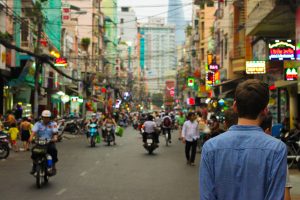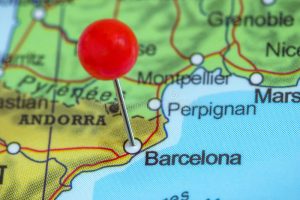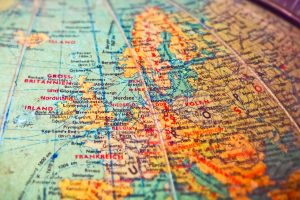Expats From Around The World Share What It's Really Like To Live In Another Country
A lot of people dream of picking up and moving their entire lives to another country. Those who have done it, however, will tell you that it's not all the stuff of dreams. Leaving home and adapting to another culture can be difficult, lonely, and infuriating. it can also be fun, surprising, and deeply rewarding. We asked expats from around the world to tell us what it's really like to live in another country.
 Pixabay
Pixabay
44. Nothing's familiar anymore.
You'll get reverse culture shock. Everyone talks about culture shock and how to deal. But when you come back to your “home country” and suddenly have that same bewildered feeling that you had when you moved abroad is horrible, because this place is supposed to be home. When I moved back from a West African city to an East Coast city, I met a friend for coffee downtown, and I was like “Why is everyone running everywhere?” It was just the faster pace of life.
43. Home is where... no really, where is home?
The fact that you can often end up not feeling fully at home anywhere. You feel like a foreigner in your new country (this is not a bad thing) but after a while if you visit your home country you can end up feeling like an outsider there too.
42. It's hard to go home.
I’m already annoyed my vacation time this year will be spent in my country of origin. Like, I love you all, but I left with reason and there’s so much to see here (USA) and the distances are so large I really would prefer spending time with my fiancé here than take him to a place where we don’t really have interest in.
On top of that I’d like to add that coming ‘home’ almost feels like a chore. I have to visit this person and have to go there and do this on top of everyone working during the weekdays it almost feels like I’m just making appearances. And there will be no time for us to be together and enjoy this mini vacation. And it’s really expensive!
 Pixabay
Pixabay
41. It's the real deal.
It is NOT like a vacation. I thought I would go explore everyday after work this marvellous and rich new world... but reality is, I am tired after work and just want to relax home.
 Pixabay
Pixabay
40. Thank you! No, thank you!
Brit living in Japan here. At the end of every work day, it's mandatory to thank your coworkers for all their hard work that day before leaving. It's just nice to feel appreciated in the work place! And now it would feel rude to not thank them.
 Pixabay
Pixabay
39. You have to slooooowwww doooowwwwn.
When I lived in Spain I learned to love that coffee to go is not really a thing. If you don't have even 3-5 minutes to sit and enjoy your cafe con leche you need to rethink your life. The American way of living always on the go is exhausting and I do my best to stop and smell the roses espresso nowadays.
38. Color outside the lines.
I remember going to Starbucks back in Cyprus and getting really frustrated when people would just push their way through the others to go stand next to the table when waiting for their coffee. Dude, if you ordered 5th then your coffee is probably gonna come out 5th, standing in the front of the line doesn't make the process go any faster.
37. It's a small world after all.
I've learned that people are pretty much the same regardless where they are from. Of course, every country or culture has their own rituals that shape a person's personality to some degree, but once you move away you realise that they think, feel and live in pretty much the same way you do. I'm 100% sure that more interaction between people from different countries would solve many conflicts in the world.
36. Your social calendar will take a hit.
Challenges vary from country to country and will also shift depending on what you're doing there. We've lived in Korea, Vietnam, Chile and now Mexico and adjustments in each place have been different.
I think the hardest part is building a social circle, particularly if you are older. Cultural differences can be a barrier to forming very close relationships and I find many of my friendships with locals have been superficial. Not in a bad way, just in that they lack depth.
 Photo by rawpixel.com from Pexels
Photo by rawpixel.com from Pexels
35. Send potatoes.
The food. I'm Swedish, living in Singapore. People here don't cook 95% of their meals, they all eat out at canteens/food courts/hawker centres all meals of the day. It's just the culture, and it's generally very cheap.
I'm so fed up with rice and noodles. I can't take it, and it's in every meal. Lately I spend so much extra time, effort and money just to get something resembling food I'm used to, with pasta and so on. Potatoes are basically unheard of.
I go to IKEA every now and then when it gets too bad. Cook at home sometimes, but I have no oven at the moment which makes it so hard to cook a lot of foods I want.
I just can't eat rice and noodles anymore, send help.
34. It's not safe to smile.
American living in Germany here. I have learned that people think you are a little bit crazy if you smile all of the time. I have also learned to be a lot more straight-forward and blunt in my conversations with Germans. When we first moved here, we were a little bit taken aback when our German neighbors gave us a key to their house for emergencies and started bringing food and flowers every so often! It is nice, like having adopted grandparents living next door. I have also stopped wearing flip flops when I go out of the house because they usually brand me as "American." Additionally, I have started relaxing just a little bit since moving here because there is so much less crime than back home. I still keep an eye out and lock my house and cars but it is nice to go on a long walk without worrying about being assaulted in one way or another. We really love it here.
 Photo by Daniel von Appen on Unsplash
Photo by Daniel von Appen on Unsplash
33. Slow down and enjoy the ride.
I live in the good ole US of A, but recently got back from a hiatus to a small island off the coast of Cancun called Isla Mujeres. For the better part of the first 2 weeks I was there I was totally shocked at the fact that establishments usually don't open right when they say they do and meals usually take 2+ hours to complete. At first it drove me crazy - I was so used to American culture that I expected the doors to be open at 9 if that's what they said and I expected my check for my food promptly after we finished.
Ultimately I let go of that "control" mentality and relaxed and went by "Mexican time", something I try to incorporate into my life today back home. What is it in me that needs everything to be done promptly and efficiently every single time? I'm happy to say I've adopted a much more laid back and understanding attitude towards everything in general. It's a lot more pleasant way to live, and it's all thanks to Mexico.
 Image by jakobhanbergerequmenia from Pixabay
Image by jakobhanbergerequmenia from Pixabay
32. Food is new, too.
Grocery shopping is totally different. I prefer cooking my own food to eating out all the time and I was super overwhelmed by groceries the first few times. None of the packages were familiar and you have to learn the words for all these things like vegetable oil, which means a lot of planning ahead. Plus a lot of the stuff you’re used to is either much more expensive or just not available at all.
On the positive side though, sometimes there’s delicious food for cheap that would be really expensive back home.
31. It's pretty pedestrian.
I travel for work and most of it is to vacation destinations.
People are always caught a little off guard when they ask me about these places and all I know about is the airport, the hotel, and the restaurants by the hotel.
That or that most of my favorite work trips are to small towns that they've never heard of and that people from the surrounding area don't think much of.
 Pixabay
Pixabay
30. It's easy to drift apart.
Your friends will slowly lose interest as you try to cling onto them via Whatsapp/Facebook and talking about the past with them in a hope they will keep reciprocating.
Even though it is a lot easier to stay in touch these days, distance is a big gap in relationships. I just don't know how to keep them interested.
 Pixabay
Pixabay
29. You're alone for a while.
The initial isolation is something I didn't expect. When we emigrated, I had a phone without a single contact in it, because I didn't know anyone. The knowledge that I had no one to call if I needed help was overwhelming to say the least.
 Nova Scotia Trails
Nova Scotia Trails
28. Your vacations are spoken for.
You will end up spending ALL of your vacation time and money vising family in your home country, especially if your parents are old and/or you have kids. All those amazing cities in Europe you want to explore? Sorry, you spent 10% of your after-tax salary flying back to the US to stay in your hometown for two weeks.
I love my family but this is really something I haven't been able to figure out and all the expats I know (past a certain age) deal with it. Denying grandparents the opportunity to see their grandkids or refusing to visit aging Mom and Dad because I want to sit on a beach in Greece seems so selfish. But man do I want to sit on a beach in Greece.
 PIxabay
PIxabay
27. Farewell, adieu, Auf Wiedersehen.
The constant goodbyes. It's not just to your family and friends at home; often the places that people move to have high turnover rates. Many of your new friends, especially other expats, return home or go elsewhere overseas. No matter where you are you will always be missing people you love.
 Pixabay
Pixabay
26. Things are too shiny.
While there may be things that you love about the foreign country you've moved to, there are usually an equal number of things you learn to hate. I moved to Japan and while I don't regret it one bit, I miss the openness of the US, and sometimes I get frustrated about how plastic-y things are here. Everything has a shiny sheen on it, physically and culturally. There's also a lot of ridiculous bureaucracy.
25. It's hard to move back.
Reverse culture shock is absolutely a thing, and can be a lot harder to cope with than culture shock. When I came back to the US from Germany, I found myself genuinely sad. I missed Germany so much. It had become my country. I loved my life in Germany I was honestly way happier there than I was in the US, but I had to go back home.
 Image by Marjon Besteman-Horn from Pixabay
Image by Marjon Besteman-Horn from Pixabay
24. You end up missing Jamba Juice.
You expect the larger cultural differences, but the smaller ones are harder to predict. For instance, sometimes I really want a bagel or a smoothie, but my new country doesn't have bagel or smoothie shops on every corner like my home country does.
May not seem like a big deal, but a lot of things like this add up pretty quickly and you end up missing a ton of small stuff that you used to take for granted.
 Image by Bruno Glätsch from Pixabay
Image by Bruno Glätsch from Pixabay
23. Dinner's going to be late.
I moved to Tel Aviv, Israel from the states. More things are more the same than different, but there are some definite differences. Things like personal space and privacy don't exist here, like at all, people are much looser with rules and regulations (and punctuality) - both for good and for bad - and are much warmer. Almost anyone you meet on the street will invite you home for dinner, and mean it.
 Image by avner nagar from Pixabay
Image by avner nagar from Pixabay
22. I see Dublin, I see France...
I have lived in two countries in the last eight years; the Republic of Ireland and (presently) France. Reasons I liked Ireland; easiest country I ever lived in, 100% health care coverage, pretty country, people are laid back, (at the time) easy to get a job, opportunities for growth and education without it being a financial crutch or disaster, simple life and tons of vacation days throughout the year. Reasons I didn't like it; People drank too much. Serious drinking culture. What I don't like about France; Bureaucracies within the state. Some things just take a while to get done. Some things are the same, ie; fast food, tv shows, etc. That being said, I love it over here.
 Photo by Edward Eyer from Pexels
Photo by Edward Eyer from Pexels
21. Say goodbye to privacy.
I live in China, and it's the lack of personal space that really gets me. For instance, when queuing in Europe, you leave at least a good meter between yourself and the next immediate person. Not in China, if you don't want a whole town jumping the queue in front of you. Also it's weird going to the doctor and having people inside the office with you waiting their turn while they examine you.
 Image by Free-Photos from Pixabay
Image by Free-Photos from Pixabay
20. Funny you should ask...
Comedy is totally different in different cultures. What I thought was a great joke doesn't apply in Spanish really. Sarcasm really isn't a thing where I live. Other then that having an open mind and not expecting people or things to be like "Back Home." Most people I have seen move down here leave in 2 years, so I guess if you're moving have an exit strategy. Also if you're moving check prices on stuff. I was so used to a TV at Walmart being couple hundred dollars, computers for dirt cheap. That doesn't exist in most places outside of US or maybe Europe, but where I live it's double if not triple on many items I took for granted when we moved here years ago.
 Pixabay
Pixabay
19. The food leaves a sour taste.
It was interesting to learn how subtle culture shock can be. I moved to a place not too dissimilar from home and I am almost fluent in the language, so it never felt all that alien to me. I did, however, notice that I got irritated at smaller things. I'd get annoyed with how mums treated their kids and even silly things like the timing of the traffic lights. And all the food tasted a tiny little bit different, but it was like every food item tasted different in the same way. Like some vinegar fairy had sprayed everything in the supermarkets with a tiny little bit of vinegar. It's also super annoying that they think pie crust is good for anything but pig food. And all the bread is too soft. And no one sells pirogis (srsly why would you choose pasties over pirogis?) or salted liquorice.
 Pixabay
Pixabay
18. Leaving home for Middle Earth.
I've lived in New Zealand for the past 7 years, and though it has its downsides (small country culture, being cut off from the world, high cost of living) I would not move back to the US. I love the people, it's a spectacularly beautiful country, they have socialized health care and even the Conservatives are more liberal than the Democrats! Also the government has one of the lowest corruption rates in the world and compared to watching American politics they actually seem to get things done at an amazing rate.
 Photo by Paula May on Unsplash
Photo by Paula May on Unsplash
17. The pros outweigh the cons?
I'm in Abu Dhabi, United Arab Emirates. It has it's pluses and minuses compared to the states. There's universal health care, and tipping is optional because everyone makes enough without it. There's sensible gun control. On the other hand, atheism, witchcraft and homosexuality are all crimes.
 Image by Neil Dodhia from Pixabay
Image by Neil Dodhia from Pixabay
16. Move there for the cheap chocolate.
I lived in Switzerland for all of 2011. My wife and I went over there for my work (clinical research). It was awesome. Beautiful country. Literally like you're living in a picture. The people LOVE and support the arts like dudes in American bands could only dream of. On the upside, the salaries are INSANELY HIGH compared to American salaries. On the downside, everything costs at least twice what it does in America, with a few exceptions (bottled water, Swiss Chocolate, and Gruyere cheese)... and some things cost WAY more (try over $10/gallon for gas!). We lived in a flat on lake Geneva that was about 500 sq ft and it was 2800 francs per month (approx. $3000 USD at the time). We only came back because my wife wanted to be closer to her family. If I were a single man, I'd be there the rest of my life. It's awesome. Highly recommend it.
15. The worst part is...
I've been living in a small fishing village in northern Mexico for almost 5 years. I love the closeness and generosity of Mexican communities, the willingness of people to accept you immediately into their lives, the cheap delicious food, and beauty of the remote islands and desert around me. I also admire the ingenuity of people who can keep a 30 year old pickup truck held together with baling wire and aluminum foil and make their living diving 8 hours a day breathing exhaust sucked into their lawnmower engine and paint sprayer frankencompressors. Also, taught me to catch fish and sharks with my bare hands.
The negatives compared to the US: slow internet, small beer selection, unbelievable bureaucratic nonsense at all levels of government, the fact that any woman I show interest in immediately wants to get married, and that I can't go out for Ethiopian food. Also, the "sushi" in Mexico is pieces of steak wrapped in battered and fried rice, which is silly.
Really though, the worst thing about living where I live are the other Americans. They tend to be conservative retired bigots who view Mexicans as servile and make fun of their gardener's halting English despite the fact they've been in Mexico for 30 years and haven't moved past "Una mas cerveza."
 Image by Michal Jarmoluk from Pixabay
Image by Michal Jarmoluk from Pixabay
14. It keeps the lights on.
Bureaucracy. Clearly, this is related to language, but it's more than just not knowing the right words. It's also about fundamental assumptions/differences about how things are supposed to work.
For example, here in Israel, renters often continue paying utility bills in the name of previous renters, even to the extent that you have never met the person under whose name you're paying. Why? Because it's a pain to change the name on the account, and the power company only cares that the bill gets paid. But as an American, I assumed that this was a basic thing to take care of upon moving to a new place. I probably spent a total of ten hours over two months calling the power company, being transferred between departments, collecting a letter from the owner of the apartment, etc. A year later I moved and just starting paying the utility bill under the existing name.
I've had this same sort of experience several times. I just don't know what I don't know about how things work in this country.
 Image by krystianwin from Pixabay
Image by krystianwin from Pixabay
13. It's full of pleasant surprises.
My wife, and later my 2 sons, and I lived and traveled extensively overseas for 20 years. One of the nice things I remember is pleasure at the lack of choice. One of the first things we noticed when we came back to the States was that there was too much choice. Who needs the choice of 25 kinds of toothpaste, or laundry powder or dog food or cleaning products? All of which are mostly made by the same companies. We saw this as such a huge waste of money and it made us realize that we were no better off with 25 options than we were with 5.
We lived in the Middle East for 10 years and enjoyed the lack of having to worry about politics, the municipal government, the school system, being sued, crime, etc. We enjoyed being able to hire a house maid or a gardener for $100 a month. Being able to let our kids play outside and not worry about someone kidnapping them.
America is a great country in many respects but it is not the be all and end all of countries. There are many other places that work as well and often better that the US.
 Pixabay
Pixabay
12. It's a study in contrasts.
I have been in Singapore, Indonesia and the Philippines for the past four years. I was quite homesick for the first six months or so, and certain day to day things like food and climate took some getting used to. Singapore was amazing as I was making $150K a year, about three times what I made in the US. On the other hand, I was paying $1,500 for a lease payment on a stock Mitsubishi Lancer.
Since I left there, I have begun to enjoy the lower cost of living in Indonesia and the Philippines. I haven't touched laundry in two years. I can go out for a nice, fresh sushi dinner for about $10 a plate.
I still watch CNN, Skype back to my mom and brother every now and then. I come from small town Midwest and quite honestly, I hate going back to the small mindedness and bigotry. Most of the other expats I meet here are as worldly as I, and more fun to talk to and hang out with.
11. Getting lost in the fjords.
I live in Norway, just outside the big city in a fairly industrial area, on the western coast. I've been here for 13 years.
Obviously things are ridiculously expensive here (I believe the last I heard Norway was the 3rd most expensive place in the world?) but there is also an interesting lack of class cues visually. Very down to earth people for the most part. Standard of living however is very high. I definitely enjoy a better life here than I would have if I lived in the USA.
It does and always has felt like home to me, for some unexplainable reason. There's a fascinating, mythical fairytale quality present hiding behind the corners of every city.
However: I miss American food A LOT. Sometimes a girl just wants a good cheeseburger and fries. Norwegians don't really "get" burgers, although I've had a decent one at an American style diner in Oslo, and a now closed hamburger shop that used fresh ground beef and fried it while you waited.
I can't foresee I'd ever give up my American citizenship, even though I haven't been home in soon 4 years. I've stuck it out through thick and thin here, studied the language, become fluent, and I'd say I feel more like an alien in the USA than I do here in Norway.
Main things I struggle with: relationships/friendships with Norwegians, social cues/rules and traditions.
 Pixabay
Pixabay
10. A real adventure.
I'm in Kumasi, Ghana. People here are loud. At all hours really. Church sometimes happens 30 feet behind my room occasionally at midnight to 5 am for faith renewal. Just imagine the volume level of a rock concert but it is all in tongues.
But with their boorishness comes some of the most in your face hospitality I have ever seen. People who have far less money than you will buy your travel ride, get your beer, walk 45 minutes (yes, 45!) out of their way to get you where you need to be. People with genuine smiles all around.
Greetings are a major thing here. A 10 minute walk could turn into 30 minutes because you need to greet every person you know. Food is something to be desired, but fufu pounding (look it up) is one of the coolest ways I have seen food prepared. Weather is always hot, but always sunny. A really great country.
 Image by jozuadouglas from Pixabay
Image by jozuadouglas from Pixabay
9. You're starting from scratch.
The idea isn't as romantic as most people think. It's as if you're resetting your progress back home and starting back from 0.
Having to find new friends, a doctor, work, housing, car, little things you don't think about like where the nearest pharmacy is, or the best school in the neighbourhood for your kids, what are the best brands at a supermarket.
And no matter what, you will suffer from homesickness the first few years. After two years or so, you'll be surprised at how much your friends from your home country have grown apart from you and changed, and you realize that you're just one person, that things will move on with or without you. Your old life becomes a distant memory which you will sooner or later need to accept that you can't go back to.
Granted, there are also a lot of positives, but the point I'm trying to make is to not have any idealised expectations, it can be very rewarding but it's really not as easy as people make it to be. Especially because most people usually only hear about the positive aspects of it through stories. It's a struggle.
8. Can't get rid of that FOMO.
One of the hardest things to get used to as an expat is that time moves on in your home country. I moved away from the states in 2012 and whenever I go back it's hard to remember that all my friends are also now older. I can't just go back to the place and time I left.
The first year is tough, you have to completely start over and while you are physically in your new country you will be mentally preoccupied with your home and friends and family. Social media can actually make it worse as you will look through rose tinted glasses and be really concerned with what you are missing out on.
However if you press through this time and establish new friends and connections you will redefine yourself. You will feel at home in the place you chose.
 Image by Free-Photos from Pixabay
Image by Free-Photos from Pixabay
7. I'm sure they're sorry.
Cuban living in Canada. When I first moved here I thought Canadians were way too quiet. Like, I don't even have to yell over anyone to be heard. I've gotten used to that, but I don't think I'll ever get used to how boring and antisocial I find most Canadians to be. Don't get me wrong, I love Canada and I have an awesome group of friends, but in general Canadians don't really like to party like Cubans. It's also expensive to have a good time here.
The people are nice, but not as outgoing as Cubans. Canadians are super friendly and apologetic, and Cubans hardly apologize for anything. But Cubans talk more and it's easy and normal to talk to strangers. Also it's never quiet, good luck getting them to shut up. Canadians are quiet, generally. Which can be nice but it's different.
People are much less relaxed here, understandably as they have more to worry about. I'm always surprised by how many Canadians don't have good relationships with their families, and just don't care. They see their families like once a year. Don't you miss everyone?
But the amount of food available is AMAZING. Latin food is hard to find but I've really learned to love Chinese and Indian food.
Overall Canada is a-okay. I like it, I want to travel more but I love living here.
 Photo by Nextvoyage from Pexels
Photo by Nextvoyage from Pexels
6. An American in London.
I live in England. It's just as regionally differentiated as the US except all the accents and cultural peculiarities are smushed into an area the size of Arizona. This is my favorite part.
Everything is really small and really expensive, and I live in a house that was built around the time of the American Civil War and that's the norm. It's damp and I am forever fighting mold growing on my walls.
I live in a city were new buildings are built next to pretty Victorian architecture. The new buildings? they were built after the pretty Victorian buildings were bombed by the Germans.
I would kill for an In-and-out burger (or the like), but English junk food is amazing.
I like England, but I'd never give up my American citizenship. The UK is just too class obsessed. And while America has it's problems it's my home.
 Pixabay
Pixabay
5. The things you'll miss.
Currently living in Sweden. A lot of American TV shows/movies are present, so if you bump into a Swede younger than fifty, chances are they speak decent English. What I really like about living here is the great healthcare, and the government aid is fantastic when it comes to getting on your feet. They pay for your apartment and food til you can land a job. It's also gorgeous here.
Of course, they also take in more people than any other country in Europe, and struggle to reach those that really do need help, compared to the people who emigrate to take advantage of the socialist government.
What I really miss about the States is the food culture/cultural diversity, and the convenience of living in a capitalist country. Shops close early, and customer service doesn't really exist. Refugees, and some Swedes may be surprised (taken aback) that you are a person of color, and will question your nationality. Try not to take offense.
4. You'll need a certain kind of attitude.
Current Expat here from the US who has lived in South Korea (5 years), Italy (2 years), and now Belgium (going on 3rd year). There are so many things that people do not tell you about, even fellow coworkers who are expats. Such as finding out that you have to buy certain plastic bags for trash, trash days are on certain days of the week depending on which side of the street you live on; driving in city centers you need a special sticker otherwise youu will get tickets; driving in other countries (in Europe) have different tolls (vignettes) as well as special stickers for driving in the city center; to buy vegetables you have to wear the plastic gloves and weigh them yourself; and locals really don’t want to be your friend because they know you are only there temporarily. Also the work ethic of your host country is really different from yours. It does take a certain personality to thrive in a different country: someone who is adventurous and someone who can solve problems themselves. Despite all the little annoyances, it is a great experience to live overseas. But again, it’s not for everyone.
 Pixabay
Pixabay
3. It makes you appreciate home.
Living abroad made me realize that we have it pretty great in the U.S. Don't get me wrong, I love where I live right now (Costa Rica), but things are just not the same here as compared to the states:
-
It's not that the food is way different, it's that there is less of a choice and it's a bit worse quality: like the pork I eat tastes worse because the pigs aren't taken care of as well on farms.
-
Culture! You get used to your culture from the country you came from, then all of a sudden you have to adjust to a new culture: new norms, new attitudes, different music, different past time, different history. For example in Costa Rica time is so much more flexible, you can arrive late to places and expect others to arrive late when meeting you and it's not considered rude.
-
A lot of things are way more expensive here: TVs and computers cost an arm and a leg, cars too compared to the states. Houses are cheaper but they're not as good quality, although for here it's fine because the weather is tame.
-
The economy here is good for Central America, but if you don't live within a bigger city or town, good luck getting a steady job. The men in my town do a lot of odd jobs to make money and a lot of women don't even work.
-
With that: the wealth gap here. In the states it's bad, but middle and lower class people can still make it and be pretty successful. Here in Costa Rica it's so much harder for lower and middle classes to move up. That's because the higher class people get such a better education, usually one that is taught in English, that they automatically get better and higher paying jobs.
Now that being said, COSTA RICA IS STILL AWESOME!!! The life is so chill and relaxed, so much less pressure. Everyone is friendly and the weather is awesome. And even though a lot of people still wanna move to the states, the national pride they have for their country is amazing!
2. Try to avoid a laundry catastrophe.
There are an enormous number of things you have to learn how to do that you never think about until you don't know how to do them wherever you live. It's pretty easy to learn about general cultural differences between your home country and your new country, but then you find yourself Googling "European windowshades" in the desperate hope that you can figure out what these things are and how you're supposed to open them when presented with nothing but a strap that doesn't seem to do anything (turns out I had to pull it a particular way).
Then you get an electricity bill you don't know how to pay and you haven't yet learned enough of the local language to figure it out, so you have to ask someone at work how to do it. Then you need to pick up some medicine, but you don't know whether you need a prescription, where you might find an English-speaking doctor who can get you one if you do, and what the procedures are at the pharmacy for picking up medicine.
Then you go to the shop to pick up some laundry detergent and have to memorize the right words in the local language beforehand in hopes they will be clearly marked on packages that clearly look like laundry detergent. If they aren't, you then spend ten minutes in the shop with Google Translate making sure you don't accidentally buy something that will bleach your clothes all white. This goes on, albeit at an ever-reduced rate, for years.
1. If only he had someone to call.
That feeling of not knowing anyone and having no one to call can last a surprisingly long time. Sure you make friends, etc., but having that one person who you can call in the middle of the night in that moment of need can take while.
When I moved to the US, I had this exact experience. I was returning from a work trip, and my flight had been cancelled due to weather. I got put on a replacement flight six hours later. I was due to be picked up at the airport by a car service, but of course with the delay this fell through and they had no one available otherwise. I know I can get the train most of the way back and then get a cab from the train station. So, no big deal...
I get the train and everything is running smooth, until they announce that there are some works going on and about half the journey will need to be done via a dreaded "rail replacement bus service". We get to the last station on the train and there's some confusion. The train was delayed, and the buses already seemed to have gone, leaving about 5 of us to sit in the waiting room for 2 hours until the next buses. We wait...
Two hours later, the replacement buses turn up and we get them. I'm going to the end of the line, and by this time there is about 10 of us on the bus. One hour in, and I'm the last one there. We get to my final stop and I'm off. But, of course, it's now 2am and due to no trains running, there are no cabs. Hmmm. At this point, if there was that someone, I'd have given them a ring, but there isn't, so I ring a cab company. The cab never shows up, and now my phone is dead and I'm at a train station in the middle of nowhere with nothing around. So, it's now 3am on a Sunday morning and I'm walking the four miles back home.
Never had I felt more alone and without help. Character building indeed.
 Pixabay
Pixabay





















